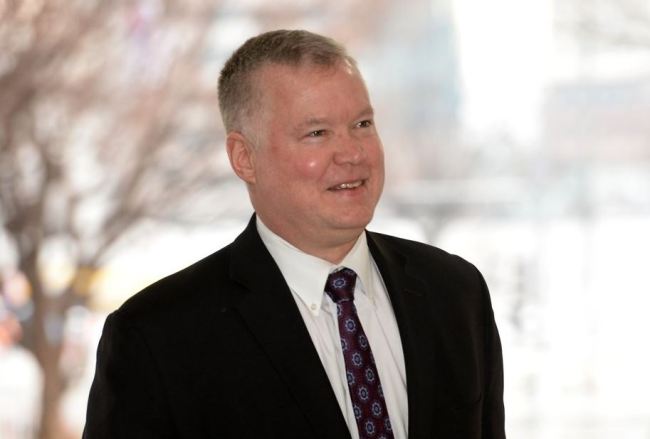Biegun says allies' cooperation can help end hostility, bring in brighter future
By YonhapPublished : Dec. 21, 2018 - 09:30
Top United States nuclear envoy Stephen Biegun said Friday that cooperation between Seoul and Washington on North Korea can help end the longstanding hostility on the Korean Peninsula and usher in a "brighter" chapter" for all people here.
Biegun made the remarks during a meeting with South Korean Unification Minister Cho Myoung-gyon in Seoul. He was in Seoul to hold a second "working group" meeting with top South Korean officials handling North Korean issues.

"The work we do together is not just for US-South Korean relations. It's for the future of the Korean Peninsula," Biegun said.
"And if we are successful, we will close the chapter of 70 years of war and hostility on the Korean Peninsula and create a new, brighter future for all of the Korean people," he added.
Citing the fact that the two have met four times in a short period of time since Biegun took office, Cho said it demonstrates how serious South Korea and the US remain in resolving issues related to denuclearization and inter-Korean relations in an appropriate manner.
"I hope this is sending a positive message to North Korea as well," Cho said.
Biegun's trip to South Korea came amid deadlocked nuclear talks between the US and North Korea since their historic summit in June where the two agreed to complete denuclearization of the Korean Peninsula.
Pyongyang wants sanctions relief in return for what it claims to be substantive denuclearization steps. Washington asks for more tangible steps before making major concessions
The stalled denuclearization talks have taken a toll on Seoul's push to expand cross-border exchanges in various areas, including inter-Korean railway and road connection, a project that the leaders of the two Koreas agreed to in April.
The two Koreas recently concluded an 18-day inspection of the North's railways in the western and eastern regions after monthslong delay caused by concerns over violations of sanctions on Pyongyang.
The United Nations earlier granted a sanctions waiver to the project. It came after Washington supported the railway project, a turnaround from its apparent reluctance to endorse it.
During the meeting with Cho, Biegun expressed "excitement" about the project.
"I'm excited to hear the results of the joint rail survey; it was led by your ministry. We watched with great excitement as the trains launched into North Korea," he said.
Seoul and Pyongyang are currently preparing to hold a groundbreaking ceremony for the joint project at Panmun Station in Kaesong on Wednesday.
Details have yet to be determined, including who will attend the event and how it will be organized. An advance team has not been sent to the North to prepare for the ceremony.
Meanwhile, asked about what has changed Washington's stance on North Korea recently on humanitarian assistance after the talks with Cho, Biegun said, "We are keeping the door open for peace."
On arriving in South Korea on Wednesday, Biegun said that the US will "reevaluate" its ban on American citizens' travel to North Korea early next year to facilitate aid groups' humanitarian assistance to the communist state.
This might give South Korea a boost for going ahead with its long suspended plan to provide US$8 million worth of humanitarian assistance via global agencies to the North. The plan announced last year has not been executed amid stalemated denuclearization talks with North Korea.
Lee Eugene, a deputy unification ministry spokeswoman, told reporters later that the government has been in consultations with global aid agencies on the proposed assistance and will decide on its provision at "the appropriate" time.
She added that Cho and Biegun exchanged views during the meeting on denuclearization and inter-Korean relations, such as the railway and road project and that they also reaffirmed their commitment to closely cooperating to bring peace and stability to the Korean Peninsula by making it free of nuclear weapons. (Yonhap)







![[Graphic News] More Koreans say they plan long-distance trips this year](http://res.heraldm.com/phpwas/restmb_idxmake.php?idx=644&simg=/content/image/2024/04/17/20240417050828_0.gif&u=)
![[KH Explains] Hyundai's full hybrid edge to pay off amid slow transition to pure EVs](http://res.heraldm.com/phpwas/restmb_idxmake.php?idx=644&simg=/content/image/2024/04/18/20240418050645_0.jpg&u=20240419100350)






![[From the Scene] Monks, Buddhists hail return of remains of Buddhas](http://res.heraldm.com/phpwas/restmb_idxmake.php?idx=652&simg=/content/image/2024/04/19/20240419050617_0.jpg&u=20240419175937)

![[KH Explains] Hyundai's full hybrid edge to pay off amid slow transition to pure EVs](http://res.heraldm.com/phpwas/restmb_idxmake.php?idx=652&simg=/content/image/2024/04/18/20240418050645_0.jpg&u=20240419100350)

![[Today’s K-pop] Illit drops debut single remix](http://res.heraldm.com/phpwas/restmb_idxmake.php?idx=642&simg=/content/image/2024/04/19/20240419050612_0.jpg&u=)